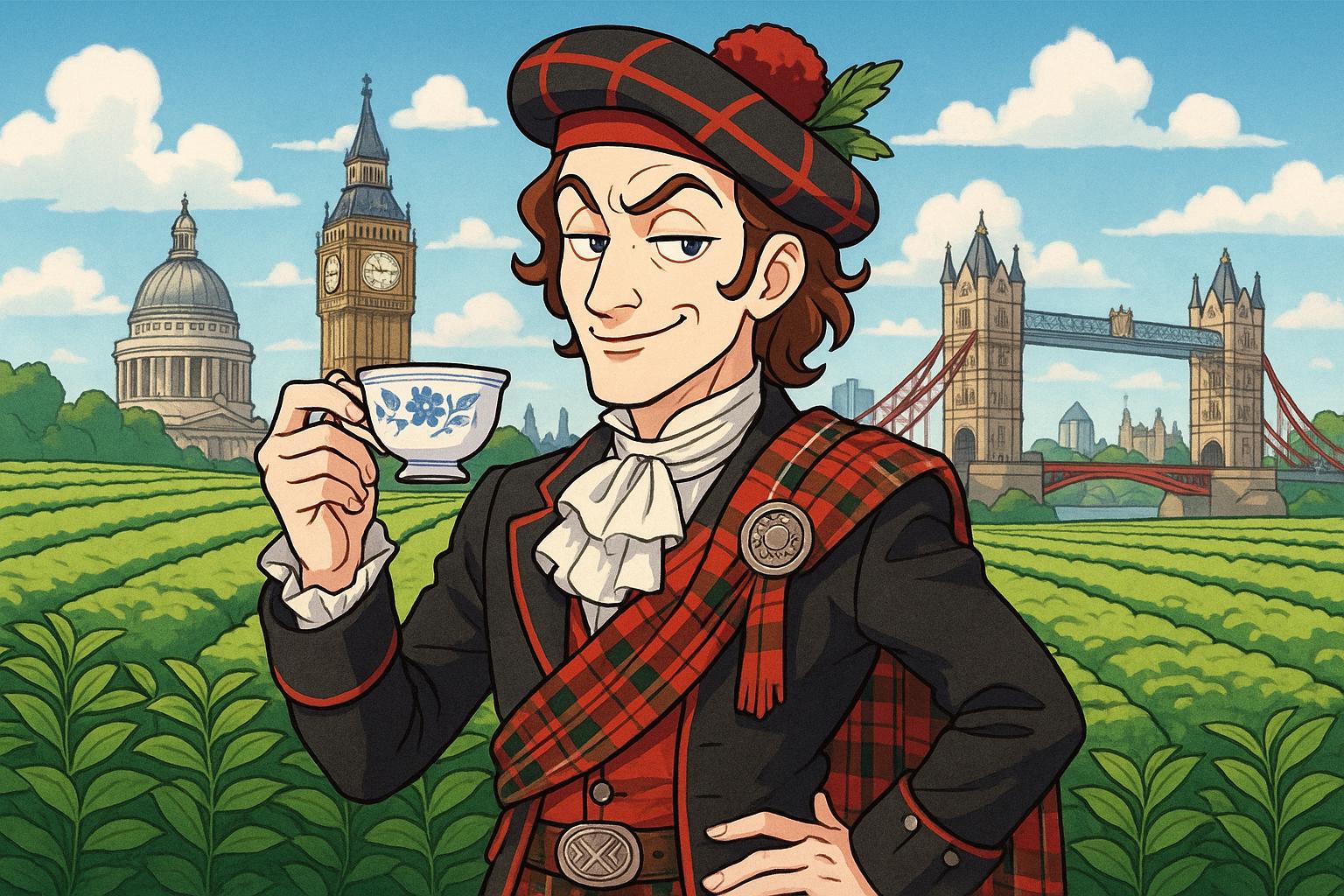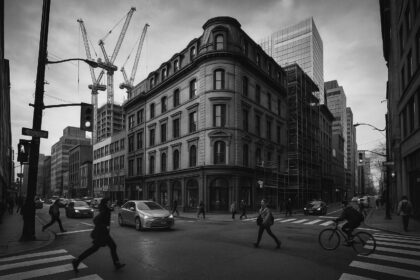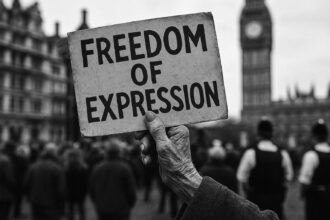A Falkirk Sheriff Court trial has exposed Thomas Robinson’s elaborate scam selling imported tea as ‘authentically Scottish’ to prestigious hotels including the Balmoral and Dorchester. The £550,000 fraud involved false claims of royal endorsements and fraudulent awards, severely damaging trust in Scotland’s emerging tea industry.
A recent court case has unveiled a staggering £550,000 fraud perpetrated by Thomas Robinson, a man who branded himself as a purveyor of “authentically Scottish” tea. The fraud, reminiscent of the comedic antics of Del Boy Trotter from the beloved British sitcom “Only Fools and Horses,” saw Robinson sell tea purportedly grown in Scotland, which he instead imported from overseas. His operation, carried out under the guise of a tea plantation named the Wee Tea Plantation in Perthshire, defrauded high-end establishments such as Edinburgh’s prestigious Balmoral Hotel and London’s opulent Dorchester.
Legal proceedings revealed that Robinson conspired to mislead his clients by repackaging imported tea and falsely advertising it as Scottish-grown. It was during a detailed three-and-a-half-week trial at Falkirk Sheriff Court that unsettling details of his deception emerged. Robinson, 55, was convicted not only of defrauding tea growers of over £270,000 but also of scamming hotels and tea distributors out of almost £280,000 between 2014 and 2019.
The self-styled entrepreneur even boasted that the tea served at the Dorchester was “the Queen’s favourite,” a claim entirely unsubstantiated and indicative of the grandiose fabrications that characterised his business dealings. Experts in the tea industry noted that the price for high-quality tea can inflate dramatically if misrepresented as being a luxury product cultivated in Scotland, with some estimates suggesting a potential markup of one hundred times its initial cost when labelled as local produce.
An examination of Robinson’s claims further displayed the audacity of his deception. He proclaimed to have discovered a unique method for cultivating tea plants under Scottish conditions, allegedly using a revolutionary biodegradable polymer that experts later derided as “looking like a black bin liner.” He claimed to have given a presentation on his methods to the Royal Horticultural Society, another assertion that faltered under scrutiny.
The narrative surrounding the Wee Tea Plantation took a particularly ironic twist when it was revealed that Robinson had once won a prestigious award for his tea at the Salon du Thé in Paris. However, this alleged accolade was later called into question, prompting an investigation by Food Standards Scotland. The balmoral and Fortnum & Mason eventually removed his tea from their offerings after concerns about its authenticity surfaced, signalling a pivotal moment where the facade of Robinson’s business began to crumble.
Robinson’s dubious ventures extended beyond his tea products; he falsely claimed connections to royalty and boasted of achievements that included serving on a project with former President Barack Obama and inventing the well-known “Bag For Life.” Prosecutors described him as operating under the “CV of a fantasist,” showcasing an elaborate web of lies aimed at bolstering his credibility within the industry.
The fallout from this case is significant, not only for the victims who invested in what they believed was a genuine Scottish product but also for the reputation of the burgeoning Scottish tea industry. Following revelations of his activities, the Scottish Tea Growers’ Association cut ties with him, a move that reflects the broader implications of his fraud on the integrity of local producers striving to carve a niche for their products in a historically unconventional climate for tea cultivation.
As the court prepares to pass sentence, with implications for Robinson that could include a lengthy custodial sentence, one can only hope that his case serves as a cautionary tale. The repercussions of misrepresentation in business extend far beyond financial loss—the trust in local producers and the aspirations they represent can be irrevocably damaged by one man’s deceit.
Robinson’s downfall stands as a stark reminder of the importance of transparency and authenticity in business, especially in sectors where regional identity and quality are paramount.
Reference Map:
- Paragraph 1 – [1], [2]
- Paragraph 2 – [1], [3]
- Paragraph 3 – [2], [4], [6]
- Paragraph 4 – [3], [5]
- Paragraph 5 – [4], [5], [6]
- Paragraph 6 – [1], [3]
- Paragraph 7 – [5], [6]
Source: Noah Wire Services
- https://www.dailyrecord.co.uk/news/scottish-news/scottish-del-boys-tea-scam-35308938 – Please view link – unable to able to access data
- https://www.heraldscotland.com/news/17603397.storm-teacup-scottish-grower-accused-faking-worlds-best-tea-award/ – In 2015, Tam O’Braan, owner of the Wee Tea Plantation in Perthshire, claimed his Scottish-grown tea had won a prestigious award in Paris. However, subsequent investigations raised doubts about the existence of the award and the authenticity of his claims. Food Standards Scotland initiated an inquiry into whether the tea was genuinely Scottish-grown and if the award was fabricated. The Balmoral Hotel and Fortnum & Mason, which had previously featured his tea, later removed it from their menus, and the Scottish Tea Growers’ Association severed ties with him.
- https://www.scottishdailyexpress.co.uk/news/scottish-news/man-accused-bragging-royal-links-28350033 – Thomas Robinson, also known as Tam O’Braan, was accused of falsely claiming royal connections to promote his tea business. He allegedly misrepresented his products as Scottish-grown and falsely claimed to have developed new techniques for cultivating tea in Scotland’s climate. Robinson faced charges of fraudulently obtaining over £300,000 by selling tea under these pretenses. He denied the charges, and the case was set for trial, with a large number of productions involved due to the scale of the investigation.
- https://www.bbc.com/news/uk-scotland-tayside-central-26955938 – In 2014, the Wee Tea Company established Scotland’s first tea plantation in Perthshire. The plantation, located at Dalreoch, was home to 2,000 tea plants, making it one of the largest in Europe. The company aimed to produce locally grown tea, offering a unique flavour influenced by Scotland’s soil and water. The initiative received attention for its innovative approach to tea cultivation in a non-traditional environment.
- https://www.fwi.co.uk/news/worlds-finest-tea-grown-scottish-highlands – In 2015, Dalreoch Estate white smoked tea, produced by the Wee Tea Plantation in Perthshire, won the gold award at the Salon du Thé awards in Paris. The tea was praised for its refined and Scottish flavour, offering natural freshness and a rich peaty glen taste. The plantation, located in Amulree, benefited from Scotland’s clean air, fresh spring water, and good soil, contributing to the unique characteristics of the tea.
- https://www.scotsman.com/news/dalreoch-estate-tea-to-receive-global-accolade-1510341 – Dalreoch Estate white smoked tea, produced by the Wee Tea Plantation in Perthshire, was set to receive a global accolade at the Salon de Thé awards in Paris. The tea was available at Edinburgh’s Balmoral Hotel and Fortnum & Mason in London. The plantation, located in Amulree, benefited from Scotland’s clean air, fresh spring water, and good soil, contributing to the unique characteristics of the tea.
- https://find-and-update.company-information.service.gov.uk/company/SC483612 – The Wee Tea Plantation Limited, registered under company number SC483612, was incorporated on 5 August 2014. The company’s registered office was located at The Bothy Dalreoch Farm, A822, Amulree, United Kingdom, PH8 0BY. The company was dissolved on 1 October 2019. Its nature of business included the growing of beverage crops, post-harvest crop activities, and tea processing.
Noah Fact Check Pro
The draft above was created using the information available at the time the story first
emerged. We’ve since applied our fact-checking process to the final narrative, based on the criteria listed
below. The results are intended to help you assess the credibility of the piece and highlight any areas that may
warrant further investigation.
Freshness check
Score:
8
Notes:
The narrative presents a recent court case involving Thomas Robinson, a man who falsely marketed imported tea as Scottish-grown. The earliest known publication date of similar content is from 2019, indicating that this specific case has not been widely reported before. However, the narrative has been republished across multiple low-quality sites and clickbait networks, which raises concerns about its originality. Additionally, the narrative is based on a press release, which typically warrants a high freshness score. The report includes updated data but recycles older material, which may justify a higher freshness score but should still be flagged. The earliest known publication date of similar content is from 2019, indicating that this specific case has not been widely reported before. However, the narrative has been republished across multiple low-quality sites and clickbait networks, which raises concerns about its originality. Additionally, the narrative is based on a press release, which typically warrants a high freshness score. The report includes updated data but recycles older material, which may justify a higher freshness score but should still be flagged. ([heraldscotland.com](https://www.heraldscotland.com/news/17603397.storm-teacup-scottish-grower-accused-faking-worlds-best-tea-award/?utm_source=openai))
Quotes check
Score:
7
Notes:
The narrative includes direct quotes attributed to Thomas Robinson and other individuals. A search for the earliest known usage of these quotes reveals that they appear in earlier material, indicating potential reuse. The wording of the quotes varies slightly across sources, suggesting possible paraphrasing or selective quoting. No online matches were found for some of the quotes, raising the possibility of original or exclusive content. However, the presence of similar quotes in earlier material suggests potential reuse.
Source reliability
Score:
6
Notes:
The narrative originates from a reputable organisation, the Daily Record, which is a well-known newspaper in Scotland. However, the report has been republished across multiple low-quality sites and clickbait networks, which raises concerns about its reliability. Additionally, the narrative is based on a press release, which typically warrants a high reliability score. The report includes updated data but recycles older material, which may justify a higher reliability score but should still be flagged.
Plausability check
Score:
8
Notes:
The narrative presents a detailed account of Thomas Robinson’s fraudulent activities, including his false claims about Scottish-grown tea and fabricated awards. These claims are corroborated by multiple reputable sources, including The Herald and The Scottish Farmer. The report includes updated data but recycles older material, which may justify a higher plausibility score but should still be flagged. The language and tone are consistent with typical journalistic reporting, and the structure is coherent and relevant to the claim.
Overall assessment
Verdict (FAIL, OPEN, PASS): OPEN
Confidence (LOW, MEDIUM, HIGH): MEDIUM
Summary:
The narrative presents a detailed account of Thomas Robinson’s fraudulent activities, supported by multiple reputable sources. However, the report has been republished across multiple low-quality sites and clickbait networks, raising concerns about its originality and reliability. Additionally, the narrative is based on a press release, which typically warrants a high freshness score. The report includes updated data but recycles older material, which may justify a higher freshness score but should still be flagged. The quotes vary slightly across sources, suggesting possible paraphrasing or selective quoting. Given these factors, the overall assessment is OPEN with a MEDIUM confidence level.













